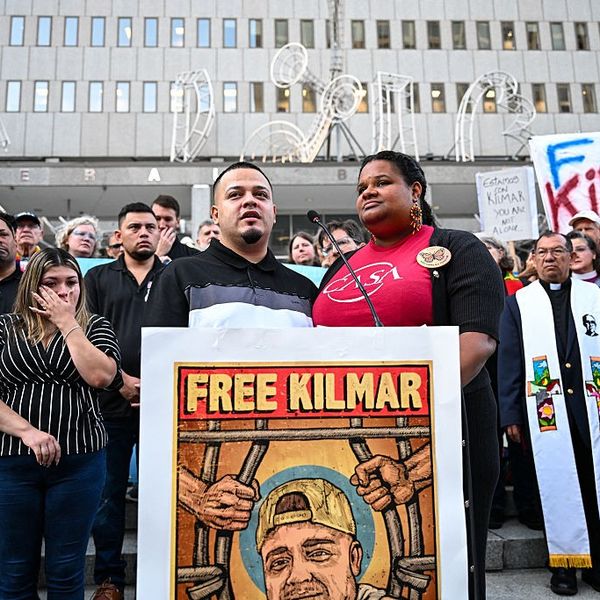Migrant rights advocates on Thursday cheered a U.S. judge's decision to temporarily block a looming Texas law that critics argue is federally unconstitutional—even though the state's Republican attorney general has already filed an appeal.
U.S. District Judge David Ezra of the Western District of Texas granted a preliminary injunction to prevent the enforcement of Senate Bill 4, which would empower local and state authorities to arrest and deport undocumented immigrants. Republican Texas Gov. Greg Abbott signed the law in December, along with S.B. 3, which allocates over $1.5 billion for "border security" measures.
"This is a major step in showing the state of Texas and Gov. Abbott that they do not have the power to enforce unconstitutional, state-run immigration policies."
"The court's decision to block this anti-immigrant law from taking effect is an important win for Texas values, human rights, and the U.S. Constitution," said David Donatti, senior staff attorney at the ACLU of Texas, in a statement. "Cruelty to migrants is not a policy solution."
The U.S. Department of Justice challenged S.B. 4 on constitutional grounds—as did a lawsuit filed by the state and national ACLU along with the Texas Civil Rights Project (TCRP) on behalf of American Gateways, El Paso County, and Las Americas Immigrant Advocacy Center. The two cases were consolidated and led to Thursday's ruling.
As the judge wrote in his 114-page opinion:
Several factors warrant an injunction. First, the supremacy clause and Supreme Court precedent affirm that states may not exercise immigration enforcement power except as authorized by the federal government. Second, S.B. 4 conflicts with key provisions of federal immigration law, to the detriment of the United States' foreign relations and treaty obligations. Third, surges in immigration do not constitute an "invasion" within the meaning of the Constitution, nor is Texas engaging in war by enforcing S.B. 4. Finally, to allow Texas to permanently supersede federal directives on the basis of an invasion would amount to nullification of federal law and authority—a notion that is antithetical to the Constitution and has been unequivocally rejected by federal courts since the Civil War
"We celebrate today's win, blocking this extreme law from going into effect before it has the opportunity to harm Texas communities," said Aron Thorn, a senior attorney with TCRP's Beyond Borders Program. "This is a major step in showing the state of Texas and Gov. Abbott that they do not have the power to enforce unconstitutional, state-run immigration policies."
Jennifer Babaie, director of advocacy and legal services at Las Americas Immigrant Advocacy Center, declared that "with today's decision, the court sent a clear message to Texas: S.B. 4 is unconstitutional and criminalizing Black, brown, Indigenous, and immigrant communities will not be tolerated."
The El Paso County commissioner for Precinct 3, Iliana Holguin, stressed that "a piecemeal approach from individual states on federal matters such as immigration enforcement would put an undue burden on local taxpayers, while opening the door to potential civil rights violations for border residents and immigrants alike."
While welcoming their win in court on Thursday, those behind the legal challenge also recognized that the fight is far from over. Blasting S.B. 4 as "blatantly unconstitutional," Anand Balakrishnan, senior staff attorney at the ACLU's Immigrants' Rights Project, said that "we applaud the court's decision, but we must ensure this harmful law is struck down altogether."
Edna Yang, co-executive director of American Gateways, also noted the broader battle for immigration reform: "While we are thankful for this court decision, we know that too many people fleeing persecution are being denied their legal rights to make their case and seek political asylum. The only way to fix our broken immigration system is through federal congressional action, not individual state action."
Some federal lawmakers also praised the ruling. Democratic Texas Congressman Joaquin Castro said that "S.B. 4 has never been about the border. It's a dangerous, extreme law that gives local authorities the power to harass and detain anyone who looks or sounds like an immigrant. I'm glad to see this preliminary injunction, and I hope S.B. 4 will never go into effect."
The court ruling and Texas Attorney General Ken Paxton's subsequent pledge to "defend Texas' right to defend herself against the catastrophic illegal invasion" came as Democratic President Joe Biden—who is seeking reelection in November—and former President Donald Trump, the likely Republican nominee, visited different cities in the state.
Just before Biden's trip to Brownsville, Amnesty International USA pressured him to "abandon cruel anti-immigrant proposals" he has considered since the failure of a legislative package that outraged rights groups and progressive lawmakers. During his trip, the president announced resources to boost Customs and Border Patrol hiring; met with border local border officers, elected leaders, and law enforcement; and called on Congress to pass the immigration package.
"Each election year or legislative session, politicians make their way to Texas border cities to announce new policies or use the border in some other way to further their political agenda," said Denisse Molina, humanitarian outreach coordinator for TCRP's Beyond Borders Program. "Border communities are not political pawns that can be toyed with to earn points from voters."
"The timing of this announcement is in direct contrast with the spirit and community celebration of Charro Days, a celebration of friendship and culture amongst the cities of Brownsville, Texas, and Matamoros, Tamaulipas," Molina added. "This is a clear political stunt showing that while Brownsville may be the backdrop, President Biden does not know the history, welcoming arms, or respect locals have for their neighbors in Mexico. We deserve better."



